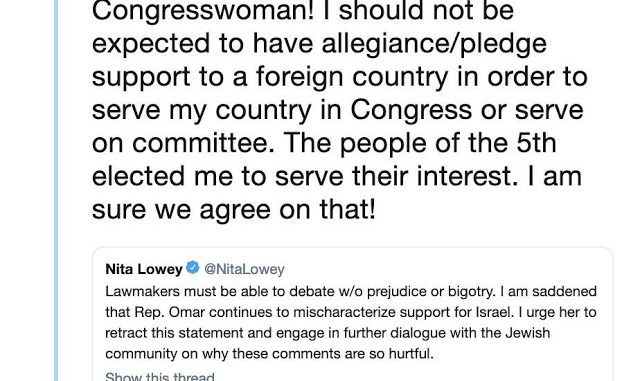
Harris came to Omar’s defense:
We all have a responsibility to speak out against anti-Semitism, Islamophobia, homophobia, transphobia, racism, and all forms of hatred and bigotry.But like some of my colleagues in the Congressional Black Caucus, I am concerned that the spotlight being put on Congresswoman Omar may put her at risk. [emphasis added]
Harris also joined Bernie Sanders and Elizabeth Warren in defending Omar, saying
“I also believe there is a difference between criticism of policy or political leaders, and anti-Semitism,
Daniel Greenfield questions how it is that Harris did not see Omar’s comments as a threat to Jews, but saw the protests against those statements to be a threat against Omar.
For that matter, how is accusing people of dual loyalty to Israel a criticism of policy?
Greenfield points out that Harris’s choice of chief of staff is also problematic:
Karine Jean-Pierre, was the national spokeswoman and senior adviser for MoveOn. The radical group has a long history of trafficking in anti-Semitism and attacking the Jewish state. It even opposed New York Sen. Chuck Schumer because, in its own words, “our country doesn’t need another Joe Lieberman.”
under [Netanyahu’s] leadership of Israel, according to the United Nations, Israel may have committed war crimes in its attacks on Gazan protesters.
This in addition to bashing AIPAC.
And this is Harris’s chief of staff.
Putting aside that Harris’s step-children call her “momalah” or that as a kid she used to collect money to plant trees in Israel, Harris appears to be part of the radicalizing trend in the Democratic party against Israel. Keep in mind that Kamala Harris has not boycotted AIPAC, has not supported BDS and co-sponsored legislation opposing UN Resolution 2334.
So why does she have a chief of staff who says Israel is guilty of war crimes?
How long can she straddle the widening chasm in the Democratic Party between those who support Israel and those who want to weaken it?
And what would 4 years of Biden, with the pressure to resurrect negotiations for a 2 state solution, mean for Israel against the backdrop of an increasingly ‘progressive’ Democratic Party?
As for Trump, last year, in a letter to Nancy Pelosi before the impeachment hearings, Trump listed what he considered his pro-Israel accomplishments:
o The US recognized Jerusalem as Israel’s capital,
o The American Embassy was opened in Jerusalem,
o The US recognized Israeli sovereignty over the Golan Heights.
o Secretary of State Pompeo announced the new US position that “the establishment of Israeli civilian settlements in the West Bank is not, per se, inconsistent with international law.”
o Pompeo also gave Israel clear support for its operations against Iran’s presence in Syria and elsewhere
We can throw into the mix that this year Trump came out with his new peace plan, which broke away from the 2 state solution model — and he played a key role in the new peace agreement between Israel and the UAE.
And of course, Trump pulled the US out of Obama’s (and Biden’s) Iran nuclear deal.
Accomplishment, no matter how many, are not in and of themselves proof that they are successful and beneficial — and Jews are still not running from the Democratic camp to vote for Trump.
But compared with where Obama — and Biden — left Israel at the end of 2016, Israel is in a better position, and not because aid is being thrown at it to buy US arms to protect itself from enemies like Iran that the previous administration strengthened.
Some, like The Wall Street Journal, think that Trump has made a positive difference in the Middle East in general and for Israel in particular.
The Wall Street Journal’s Editor-At-Large, Gerry Baker, writes
For those of you with deficient memories, let’s review this strategic record of the two decades before President Trump took office: the ascent of al Qaeda and 9/11; the catastrophe of Iraq and the messy, bloody stalemate of Afghanistan; the collapse of U.S. authority in the Middle East in the face of civil war in Syria and Libya; the rise of Islamic State; a resurgent Russia gorging itself on Eastern Europe; and the inexorable, unchallenged rise to superpower status of China.Part of the problem the foreign policy establishment has with Mr. Trump is that it’s hard to stomach that a dilettante has been so effective. Whatever you think of the president, his inconsistencies, his curious taste for the world’s autocrats and his bombast, his efforts have proved more consequential than those of the bipartisan foreign policy establishment that came before him. On the three biggest strategic challenges the U.S. confronts—the Middle East, China and the Western alliance—the president has radically reoriented U.S. policy.
…The Trump administration dispensed with it all: no enforced rapprochement for Israel with recalcitrant Palestinians, no American blood shed to build neoconservative sandcastles of democracy, no illusory engagement with the mullahs.
It’s too soon to assert with confidence that this Trumpian tripod of strategic innovation has irrevocably advanced America’s objectives. But at the very least it represents a sharp break from years of bipartisan failure.
It would be interesting to see what another 4 years of Trump could bring.
Who knows, maybe Trump might even avoid getting impeached a second time.


Leave a Reply